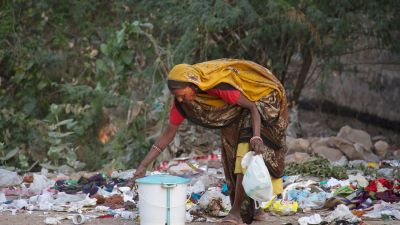Context-
On March 1st, International Waste Pickers Day, a day of remembrance and recognition for waste pickers globally, commemorates the lives lost and the struggles faced by those who engage in informal waste picking. This community, often overlooked and marginalized, plays a pivotal yet invisible role in waste management systems, particularly in countries like India where their contributions are indispensable.
- Informal waste pickers, as defined by the International Labour Organization, form a critical segment of the waste management ecosystem, engaging in activities such as collection, sorting, and trading of recyclable waste. Despite their indispensable role, they encounter systemic marginalization characterized by non-recognition, exclusion from social security schemes, and lack of legal protection.
- Data from the Centre for Science and Environment indicates that globally, the informal waste economy employs approximately 0.5%–2% of the urban population, with many being women, children, and the elderly. In India alone, the Periodic Labour Force Survey 2017-18 identifies nearly 1.5 million waste pickers, with half a million being women. These individuals often work long hours in hazardous conditions, collecting between 60 kg to 90 kg of waste daily without adequate safety equipment.
- Moreover, informal waste pickers face health issues ranging from dermatological to respiratory ailments, exacerbated by their subordinate position in the caste hierarchy. Private sector involvement in waste management further marginalizes them, pushing them into hazardous activities like scavenging from dump sites. Despite their pivotal role in recycling, waste pickers remain invisible in policy frameworks, leading to their exclusion from initiatives like Extended Producer Responsibility (EPR).
Extended Producer Responsibility and Its Implications:
- Extended Producer Responsibility (EPR) has emerged as a promising mechanism to enhance plastic waste management in India. However, its implementation threatens the livelihoods of informal waste pickers. While EPR ostensibly holds producers accountable for waste management, it often bypasses the informal sector, redirecting waste away from them and towards large-scale recycling units.
- The lack of inclusion of informal waste pickers in EPR guidelines exacerbates their vulnerability. The Solid Waste Management Rules 2016 mandate their involvement in waste management systems, yet implementation falls short. The EPR Guidelines 2022, published by the Ministry of Environment, Forest, and Climate Change, overlook the role of informal waste pickers, highlighting a systemic disregard for their contributions and rights.
Plastic Treaty and Just Transition:
- Globally, waste pickers play a crucial role in recycling, collecting up to 60% of all plastic waste. Despite their contributions to sustainable recycling, they struggle to earn a decent living and face health hazards from exposure to burning plastic fumes and microplastics. As nations strive to end plastic pollution, it is imperative to ensure a just transition for waste pickers within the framework of the proposed Plastic Treaty.
- India, grappling with rising plastic waste generation, must recognize the traditional knowledge possessed by waste pickers in handling waste. While the EPR mechanism holds promise, its formulation must integrate the expertise and experiences of informal waste pickers to ensure effective implementation and equitable outcomes.
Way Forward
● Recalibration of EPR Policies
-
- For EPR to fulfil its promise of sustainable waste management and social inclusion, a recalibration of its guidelines is imperative.
- Recognising the traditional knowledge possessed by waste pickers and involving them in decision-making processes can enhance the effectiveness of EPR systems.
- Additionally, stakeholders, including producers and policymakers, must actively engage with informal waste pickers and their representative organizations to ensure a fair and just transition.
● Plastic Treaty and a Just Transition
-
- Globally, waste pickers contribute significantly to sustainable recycling, collecting, and recovering up to 60% of all plastic.
- Despite their vital role, their work is undervalued, and they struggle to earn a decent living.
- The imminent global Plastic Treaty, aiming to address plastic pollution, must ensure a just transition for these workers, recognising their contributions and safeguarding their livelihoods.
Conclusion:
In conclusion, the world of informal waste pickers represents a microcosm of systemic inequalities within waste management systems. Despite their critical contributions to recycling and waste management, waste pickers remain marginalized and excluded from policy frameworks and initiatives like EPR. As India and the global community strive towards sustainable waste management practices, it is imperative to center the voices and experiences of informal waste pickers.
By recognizing their rights, integrating their expertise, and ensuring their inclusion in policy formulation, we can create a more equitable and sustainable waste management ecosystem. As we commemorate International Waste Pickers Day, let us not only honor the lives lost but also reaffirm our commitment to uplifting and empowering those who labor tirelessly in the shadows of our waste.
|
Probable Questions for UPSC Mains Exam-
|
Source- The Hindu







